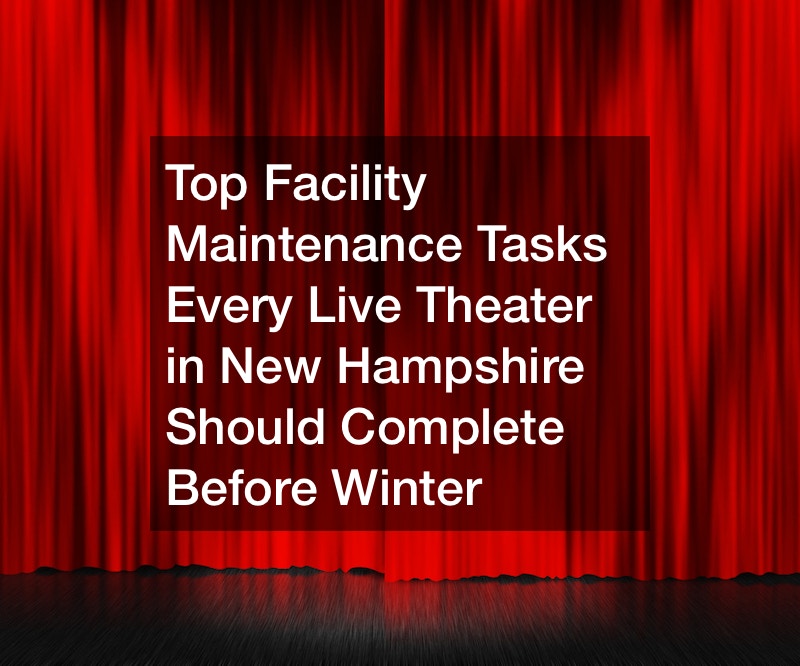
Theaters have been a vital part of human culture since the 6th century BC. A theater offers a unique experience where people come together as a community and enjoy live performances.
Live theater in New Hampshire rivals the world’s best. From lively musicals to dramatic arts that summon all the emotions a man is capable of, these theaters are the epitome of art.
A live theater offers incredible stocks to hold fast to the human spirit and community involvement. But how can we uphold these experiences all year round?
Winter in New Hampshire

The summer is finally over. The cold winter is approaching. When it comes to maintaining a live theater in New Hampshire, winter brings a whole new set of challenges. The winter in New Hampshire is that time of snow-covered streets, water softener, frozen ponds and streams, and vocalists with hot cocoa.
Maintenance managers in the New Hampshire regions are approaching that time of year when attention to weather forecast is as important as other duties at their facilities. Preparation is key as temperatures start to drop. A live theater requires careful planning, the crashing temperatures could cause problems that may threaten the vital culture. To help you prepare your theater for winter, we’ve put together top facility maintenance tasks every live theater in New Hampshire should complete before winter.
Inspect and Repair Theater’s HVAC system
While maintaining the theater heating, ventilation, and air conditioning system is good all year round, it is critical during winter. Adequate air circulation is essential during the cold season of winter. This is especially for theaters that hold packs of people in the flu-strikes cold seasons.
Failing to brace the HVAC system in your theater for winter issues will create unhealthy and unsafe conditions for the audience, destroy your valuable assets, and can cause huge facility damage. As part of your winter tune-up, engage your technician to replace air filters, complete water heater repair tasks, calibrate your thermostat, and examine heating components.
Additionally, it would be best for every live theater in New Hampshire to winterize the theater system’s cooling components. Winterizing includes replacing the refrigerant, draining the drain, and cleaning the coils to prevent mold growth. HVAC repair also involves cleaning the ducts to eliminate mold, dust, pollen, and other contaminants that may affect air circulation and air quality inside the theater.
Check on Lighting

No matter the performance, proper lighting in a live theatre is a must. Lighting is the pillar that transforms a performance from an art to an inspired function. It’s the topmost technical lifeblood of theatre which involves a lot more than turning a switch.
The winter months bring shorter days and less daylight in New Hampshire, so now is the best time to get ahead with your lighting.
Effective theater lighting energizes the mood, increases personal safety, deters potential thieves, and reduces the risk of accidents for theater visitors. This is especially in areas such as car parks and walkways.
Check lamps and wiring and make sure to replace all broken components. Also ensure timers, presence sensors, and daylights are set correctly.
Have a Plan for Snow and Ice Removal
Snow and ice on the driveway, parking lot service, or walkways are dangerous and can even make your theater inaccessible.
As part of winter preparations, you should create safe conditions to avoid slips and injuries that could lead to lawsuits.
If you own a live theater in New Hampshire, you’ll need to have a plan for clearing the theater parking lot and walkways before the snow starts to fall. You may consider contracting snow removal professionals to help clear away ice and snow quickly and efficiently.
You’ll need to set aside a space on the compound to store the snow while it melts. It’s advisable to plan this ahead and reserve a spot where this snow will be kept.
The spot should be out of the way of pedestrians and cars. Be sure to avoid places where melting ice could spill over onto walkways and re-freeze to avoid creating a safety hazard. Storing snow on your lawn is neither recommended as it will kill the grass.
Prepare the Landscape

The landscape and surrounding environment of a theater play an important role in preparing for a great show. Unfortunately, the elements of winter can be very rough on plants, grass, trees, and damage your septic tank.
Luckily, there’re preparations that can be made now to protect the landscape through the winter. The following are several tips to prepare the theater landscape before winter:
- Tree pruning – Now is the best time to trim. Trees are usually dormant during winter months making it the ideal season for pruning. Pruning involves cutting dead and damaged branches to reduce the chances of them breaking off during a storm.
- Get tree inspection – Winter can be tough on trees and plants. With weakened immune systems, trees and plants have to deal with pests and diseases, snow, and storms. You may need an arborist to inspect your trees and identify any potential problems and recommend solutions based on their findings.
- Tree mulching – Cover the soil around the plant with a 2 to 4-inch layer of mulch. Mulching helps keep the soil around the plant warm therefore preventing its roots from freezing.
Keep your trees well-hydrated before and during winter – Keep trees hydrated by watering them during warm days. Extremely cold causes the ground to freeze solid, thereby preventing water from reaching the roots. Watering the trees when it is above freezing causes the water to soak into the soil and be accessible to the trees.
Be ready to protect trees – Be prepared to give protection to the most vulnerable plants when temperatures start to drop to freezing or when their leaves fall. Young trees are most vulnerable. Cover the susceptible trees with burlap, tarps, or sheets. You can also move potted plants to more protected locations.
Get Your Roof Ready
The roof is the best line of defense against the cruel winter weather. It makes total sense to protect your facility from the top. So, before that harsh weather arrives, it’s important to ensure your roof is ready.
A roof repair will help you identify problems and get them fixed before the stormy season. A checkup is also a good way to find small issues that could escalate into dangerous leaks if left unrepaired.
Roof preparation before winter should include:
- Shingles Repair: A roofing professional should look for improperly installed, damaged, and missing shingles. Inspect sections of shingles that are sunken, which is a sign of damage. The professional should also find shingles with damaged sealant and repair them. Besides, shingles in good condition should be sealed.
- Flashing and fixing: A roof flashing is a thin piece of metal sheet used to waterproof the protrusions and perimeter of roofing systems. The roofer should ensure the flashing isn’t rusted, bent, or has any sign of damage.
- Valleys inspection: Roof valleys are the most vulnerable area of the roof in the winter. Ensure your valleys were correctly installed and that they are in good condition. Roof valleys may need to be cleaned to clear leaves and pine needles that have a tendency to pile up in the valley.
- Gutters and pipes fixing: If your theater roof has gutters, it’s important to make sure they are clean before winter. You can hire a local plumber to look out for sagging, leaky, or misaligned gutters and fix them.
- Sealant fixing: Roof sealant helps keep roof plumbing, vent flashing, and other features in place. Sealant is also applied over exposed nails. The professional should ensure that there’s enough sealant and that it’s not cracked.
- Tree maintenance: Ensure all nearby weak trees are removed to avoid falling when storms come. Tree removal is also key in minimizing the chances of accidents
- Others Signs: There’re many other signs of roof damage to look for while examining the roof. These signs include a lack of small electronic enclosures on electric wires, tree damage, algae growth, animal infestation, and a damaged basement waterproofer, among others.
Have Tools for Winter Ready

Between slippery driveways and sidewalks, it can be hard to make your way to a live theater in New Hampshire during winter. But you don’t have to worry much about your facility and your business.
From the parking lot to the theater entrance, the following is a list of important winter tools to help maintain the flow of people to and from the theater.
- Roof Snow Rake – The last thing you want in a theater is the roof to bulge in while the performance is ongoing. A roof snow rake is a 15 to 20ft long aluminum hoe that’s used to lighten the snow load on the roof and to stop the formation of ice dams. If you’ve not installed heat panels on the roof, use the roof snow rake and save your facility from all the damage that comes from accumulated snow.
- Bulldozer Broom – Do you want assurance that your guests will have a way in and out when the snow falls? A bulldozer is a wide, heavy broom that can quickly create a walkway through the snow. Unlike a shovel, the bulldozer broom can sweep off the deck without any damage to the surface. If you want to quickly remove snow from walkways, you’ll love working with this broom.
- Ice melt and spreader – Also known as de-icer, ice melt helps lower the freezing point of water, therefore preventing the buildup of ice. A big bucketful will serve you for the entire winter season. Ice melt can be stored in a garage or in a shed. It’s non-corrosive and safe for pets and grass. While the ice top won’t stop accumulation, it will help prevent the bottom layer of accumulated ice and snow. The spreader is used to uniformly distribute the ice melt over the driveway and walks.
- Sidewalk Scraper – The tool is used to Break tough ice on paths, car parks, driveways, and roads. They help make surfaces safe for both pedestrians and drivers. Instead of using a hoe or gardening shovel, make the ice-removing work easier by using a specially engineered sidewalk scraper.
- Snow Blower with Cab – A motor-driven machine used to clear snow from an area by throwing it out to the side and to the air. Snow blowers are great for getting the white snow stuff off your theater area with the least amount of effort.
Know Weather Forecaster’s Terms in Winter
Running a live theater in New Hampshire is a perfect idea. Live theatre helps to promote, dialogue, social discourse, and potential social change and helps rejuvenate people during harsh weather conditions.
However, theater management should be careful and take caution against the dangers of winter storms and snow. Forecasts should be taken seriously during winter. Use the information to plan accordingly.
- The following are important terms used by weather forecasters during winter:
- Winter Storm Watch – An alert for possible heavy snow, a blizzard, heavy sleet, or heavy freezing rain. Winter Storm Watches are often issued 16 to 48 hours before the beginning of a Winter Storm.
- Winter Storm Outlook – An WSO is issued 3 to 6 days prior to a Winter Storm Watch. It’s issued when the forecaster believes storm conditions are possible.
- Winter Storm Warning – Alert Issued when hazardous winter weather in the form of heavy snow, a blizzard, heavy sleet, or heavy freezing rain is imminent or occurring. These warnings are issued 12 to 24 hours before the event’s expected start time.
- Blizzard Warning– Issued when the forecaster believes snow combined with strong winds will produce blinding snow, deep drifts, near-zero visibility, and life-threatening wind chills. When this warning is issued, seek refuge immediately.
- Winter Weather Advisories – issued when there are accumulations of snow, freezing drizzle, freezing rain, and sleet expected to cause significant inconveniences and will be hazardous for drivers and pedestrians.
Conclusion
Winter in New Hampshire can be extremely harsh. Snow can range from moderate precipitation over a few hours to a blizzard that may last several days. If you own a live theater in New Hampshire, you should start preparing for winter to avoid damage.
Preparing for winter in advance helps you to mitigate the risks, minimize damages from storms, and safeguard your facility and occupants.
In this guide we’ve looked at top facility maintenance tasks every live theater in New Hampshire should complete before winter. These recommendations, if well implemented, will help your theater to safely navigate through the winter season.



